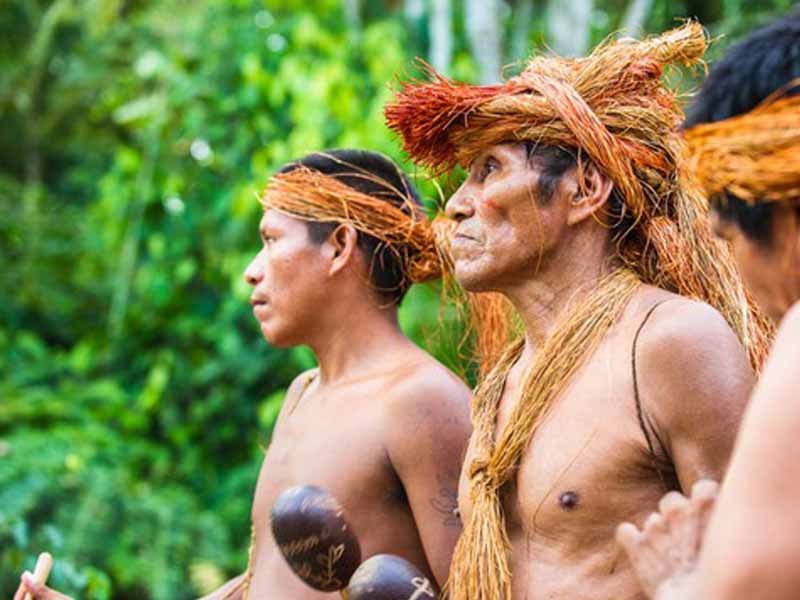
Johnhawkinsunrated – The Wari tribe, a once lesser-known group in South America, practiced an extraordinary and unique ritual upon the death of a member. This practice, involving the consumption of the deceased’s body, was seen as an expression of love and respect for the departed soul. While this may sound shocking to outsiders, for the Wari people, it was an essential part of their culture, with profound spiritual significance.
The Wari people are an ancient tribe believed to have originated around the 600s in South America, particularly along the Pacific coast, in an area now known as Pakaa Nova. Over time, their settlement was disrupted by war, and by the 19th century, the Wari moved to the Amazon Basin in Brazil, where they continue to live today.
Their traditions are steeped in a deep connection to the natural world and the spirit realm. One of their most unique practices, however, was their approach to death and burial.
When a member of the Wari tribe passed away, their burial was not a somber affair. Instead, it was a sacred and meaningful ritual. The community would gather to honor the deceased, and after several days of mourning rituals, the process of burial would begin.
“Noah Builds the Ark, A Story of Faith and Obedience”
The tribe’s leader, known as the chief, played a central role in this ceremony. The deceased’s body was carefully prepared, and the chief would then lead the community in a ritual that involved sharing the body’s flesh. The meat was divided among the members of the tribe to symbolize a collective act of mourning and unity.
In an important part of the ritual, the chief would consume the deceased’s brain. This act was symbolic — by eating the brain, the chief hoped to absorb the wisdom and knowledge that the deceased had possessed during their life. For the closest family members, such as the wife, eating the heart was a way to preserve the love and emotional bond that had existed between them.
The process was carried out with great care, using sticks or skewers to handle the body. After the consumption of the flesh, the remaining bones and hair were cremated, marking the end of the ritual.
To outsiders, the idea of cannibalism may seem horrifying. However, for the Wari people, this practice was deeply meaningful. It was believed that the human soul resided within the body. And in order to release the soul into the afterlife. The physical form had to be destroyed. By consuming the body, the Wari were not just honoring the deceased but also keeping the deceased’s spirit alive within the living.
This ritual was not just about physical consumption; it was also an emotional act. It helped the Wari people retain the essence and memory of their loved ones, keeping their spirit alive for generations. By destroying all objects associated with the deceased, such as their home and belongings. They ensured that the deceased would not be tethered to the material world.
In the 1960s, the Brazilian government intervened and prohibited the practice of ritual cannibalism. The Wari tribe was forced to abandon this ancient tradition. While the elders of the tribe still reminisce about the old ways and view them as a more loving, respectful, and comforting approach to death, today. The Wari tribe follows conventional burial practices, similar to those of the outside world.
The traditions of the Wari tribe offer us a fascinating look into a culture. That viewed death not as an end but as a transformative journey. While their customs may seem alien to modern sensibilities, they reflect a deep respect for life, wisdom, and love. Today, the Wari, like many other tribes, have adapted to the outside world. But the memory of their unique burial practices lives on as a testament to their rich and intricate worldview.
“Universal Garage Door 433MHz Remote Control Duplicator”
[SITE_NAME] - city dwellers analog hobbies are gaining renewed interest as urban residents increasingly embrace traditional, hands-on activities to escape…
[SITE_NAME] – pop culture inspires modern creative expression by continuously shaping artistic trends, influencing music styles, and redefining design concepts…
[SITE_NAME] - film reviews that feel more like conversations have reshaped how audiences engage with cinema by fostering inclusive dialogue…
John Hawk Insunrated – The resurgence of analog aesthetics modern creative enthusiasts is redefining how artists and collectors engage with…
John Hawk Insunrated - personal experiments that changed my approach to daily decisions have profoundly influenced my mindset and problem-solving…